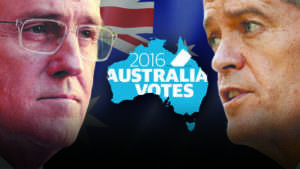Almost 200 years ago Prussian military theorist Karl von Clausewitz famously wrote that “war is an extension of politics, but by other means.”
Modern day politics is a battle of ideas; that begins with a clash of contending philosophies and ends with a vote in parliament or at the ballot box.
The Coalition’s implosion at the ballot box was the combination of a series of missteps and miscalculations. As a committed conservative, I certainly take issue with Liberal campaign which was long on expedience and short on principle.
But the fatal flaw at the heart of the Turnbull’s campaign was his failure to comprehend the fundamental nature of political warfare. And this incomprehension rendered the Coalition unable to seize and retain the initiative – a prerequisite for victory in the clash of ideas that is modern politics.
On the political battlefield seizing the initiative means generating a dynamic in which your narrative rises through the media froth to dominate the news cycle. This is precisely what Labor achieved in their perfectly timed and consummately executed scare campaign on Medicare.
It matters not that Shorten’s Mediscare messaging played extremely fast and loose with the truth. The only pertinent metric is that the ALP was firmly in the driver’s seat throughout the final week of campaigning. The battlefield initiative was entirely theirs.
The ALP’s surprise démarche forced Turnbull to fight a defensive battle on political terrain of Shorten’s choosing. Every minute spent reacting to Labor’s Mediscare campaign was a minute the Liberals could not use to promote their own narrative.
It’s said that at no battle plan never outlives first contact with the enemy. Victory in political warfare can only be achieved through organisational and intellectual flexibility. Napoleon used the term coup d’œil (a stroke of the eye) to describe the ability of superior military commanders instinctively to decipher the flow of events amidst the tumult of battle.
Yet when Shorten opened fire with its Mediscare ads, the Coalition was caught flatfooted. Mark Twain once wrote that a lie would travel halfway around the world before truth can get its boots on. But Turnbull’s response was indecisive to the point of being lethargic. By the time the Coalition enlisted the Australian Medical Association to rebut Shorten’s allegations, it was far too little, far too late.
Amidst the hurly-burly of battle – political or actual – the difference between audaciousness and recklessness is entirely contextual. The same course of action that brings success in one circumstance will reap disaster in the next. Note the cavalry charge by the Light Brigade at Balaclava in 1854 that ended in fiasco while the cavalry charge by the Light Horse at Beersheva in 1917 ended in triumph.
The Coalition proved to be bold where it should have been cautious and cautious where it should have been bold. Turnbull’s rash anti-free enterprise superannuation policy won him no friends and succeeded in alienating key elements of the Liberal base.
And there’s little doubt that the Coalition’s mid-campaign proposal for a radical reform of state-federal taxation was crazy-brave to the point of stupidity. Any such proposal would entail an interminable process of horse-trading to achieve the holy grail of unanimous consent amongst the Commonwealth, states and territories. So why go there in the midst of an election?
One moment Turnbull was extolling this scheme as the most far-reaching Constitutional reform in living memory. Yet in the blink of an eye, he cast his tax proposal overboard like the ticking political hand grenade it had become.
The end result? Turnbull came away looking foolish and feckless, akin more to Cardigan (the Light Brigade) than Chauvel (the Light Horse). Any such an outcome is a kiss of political death for anyone seeking a mandate to govern in parlous times.
Modern parliamentary democracy turns Prussian military theorist Karl von Clausewitz on his head in the sense that politics are an extension of war by other means. And thankfully those other means are ballots rather than bullets.
But the bloodless nature of political warfare doesn’t detract from its unavoidably adversarial nature. Politics begin with a clash of contending philosophies and end with a vote on the floor of parliament or at the ballot box that only one party will win.
Victory requires a combination of vision, aggressiveness, tenacity and judgment that was sorely lacking in the Coalition campaign. The Liberal Party has again been tested in the crucible of political combat and found wanting. For the Liberal Party to earn future election success, they must learn to fight dirty like the Labor Party and embrace the principles of political warfare.

